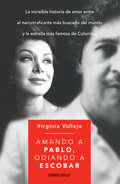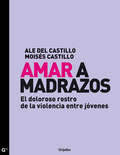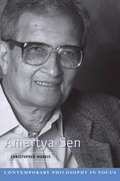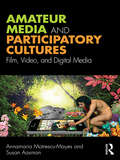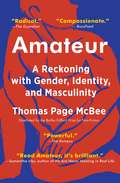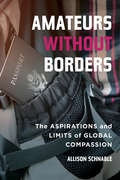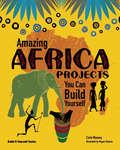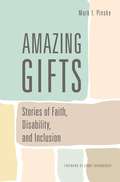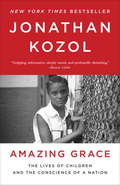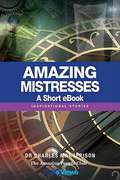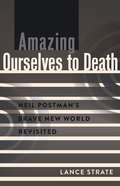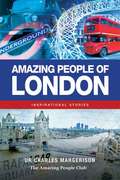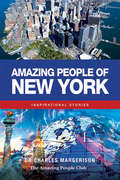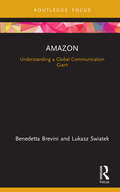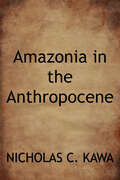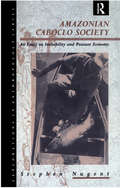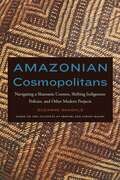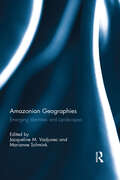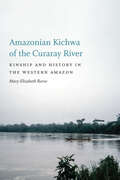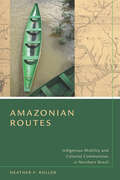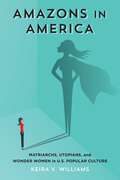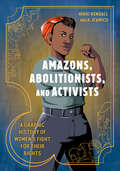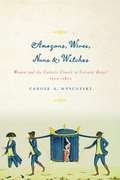- Table View
- List View
Amando a Pablo, odiando a Escobar
by Virginia VallejoAmando a Pablo, Odiando a Escobar cuenta desde la intimidad la historia del narcotraficante más poderoso de todos los tiempos: Pablo Escobar, el creador de los cárteles. Virginia Vallejo, quien fuera su amante y compañera durante más de cuatro años, narra una historia que nadie más podía haber contado. La increíble historia de amor entre el narcotraficante más buscado del mundo y la estrella más famosa de Colombia En julio de 2006 un avión de la DEA sacó a Virginia Vallejo de Colombia. Su vida estaba en peligro por haberse convertido en el testigo clave de los dos procesos criminales más importantes de la segunda mitad del siglo XX en su país: el asesinato de un candidato presidencial y la toma del Palacio de Justicia, donde fallecieron alrededor de cien personas, entre magistrados, guerrilleros y civiles. Veinte años atrás, Virginia Vallejo era la presentadora de televisión más popular de Colombia y la celebridad que aparecía en las portadas de las principales revistas. Cortejada por multimillonarios, conoció en 1982 a Pablo Escobar, un misterioso político de treinta y tres años que en realidad manejaba los hilos de un mundo de riqueza inigualable, en el que gran parte del incesante flujo de dinero procedente del tráfico de cocaína se canalizaba a proyectos de caridad y a las campañas de candidatos presidenciales de su elección. Este libro, una apasionada historia de amor convertida en crónica del horror y la vergüenza, describe la evolución de una de las mentes criminales más siniestras de nuestro tiempo: su capacidad de infundir terror y generar corrupción, los vínculos entre sus negocios ilícitos y varios jefes de Estado, los asesinatos de candidatos presidenciales y la guerra en que sumió a su país. Amando a Pablo, odiando a Escobar es también la única visión íntima posible del legendario barón del narcotráfico, plena de glamour y espíritu de supervivencia, y no exenta de humor. Virginia Vallejo narra esta historia descarnada como nadie más podía haberlo hecho.
Amar Akbar Anthony: Bollywood, Brotherhood, and the Nation
by William ElisonThe 1977 blockbuster Amar Akbar Anthony about the heroics of three Bombay brothers separated in childhood became a classic of Hindi cinema and a touchstone of Indian popular culture. Beyond its comedy and camp is a potent vision of social harmony, but one that invites critique, as the authors show.
Amar a madrazos: El doloroso rostro de la violencia entre jóvenes
by Moisés Castillo Ale del CastilloAmar a madrazos mostrará los casos de quienes han amado con violencia de todo tipo: psicológica, física, económica y sexual. Todos asumen una historia que quieren compartir para evitar que vuelva a suceder. Amar a madrazos es una lectura que no permite la indiferencia. Los protagonistas de este libro son jóvenes que decidieron compartir episodios de su vida donde el amor se ha combinado con golpes, humillaciones, abusos, y una clara ausencia de respeto. Los autores son jóvenes periodistas que han hecho exhaustivas investigaciones para dar con casos que muestran que la violencia no es exclusiva de ningún nivel educativo, económico ni cultural. Los expertos también se han sumado al compromiso de hacer eco sobre el tema de la violencia juvenil, y han aportado sus valiosas opiniones, resultado de su experiencia sobre el tema. Tú, que tienes este libro en tus manos, también podrías hacer algo para evitar este grave problema. Laviolencia en las relaciones es un tema que debe difundirse ya que nadie se encuentra exento de la manipulación amorosa: de ser amado hasta que duela o de amar hasta tener el control total sobre el otro. La violencia no debe justificarse de ninguna manera.
Amartya Sen
by Christopher W. MorrisAmartya Sen was awarded the Nobel Memorial Prize in Economics in 1998 "for his contributions in welfare economics." Although his primary academic appointments have been mostly in economics, Sen is also an important and influential social theorist and philosopher. His work on social choice theory is seminal, and his writings on poverty, famine, and development, as well his contributions to moral and political philosophy, are important and influential. Sen's views about the nature and primacy of liberty also make him a major contemporary liberal thinker. This volume of essays on aspects of Sen's work is aimed at a broad audience of readers interested in social theory, political philosophy, ethics, public policy, welfare economics, the theory of rational choice, poverty, and development. Written by a team of well-known experts, each chapter provides an overview of Sen's work in a particular area and a critical assessment of his contributions to the field.
Amateur Media and Participatory Cultures: Film, Video, and Digital Media
by Susan Aasman Annamaria Motrescu-MayesAmateur Media and Participatory Cultures aims to delineate the boundary line between today’s amateur media practice and the canons of professional media and film practice. Identifying various feasible interpretative frameworks, from historical to anthropological perspectives, the volume proposes a critical language able to cope with amateur and new media’s rapid technological and interpretative developments. Conscious of the fact that amateur media continue to be seen as the benchmark of visual records of authentic rather than mass-media-derived events, Annamaria Motrescu-Mayes and Susan Aasman pay particular attention to the ways in which diverse sets of concepts of amateur media have now merged across global visual narratives and everyday communication protocols. Building on key research questions and content analysis in media and communication studies, they have assessed differences between professional and amateur media productions based on the ways in which the ‘originators’ of an image have been influenced by, or have challenged, their context of production. This proposes that technical skills, degrees of staging and/or censoring visual information, and patterns in media socialisation define central differences between professional and amateur media production, distribution and consumption. The book’s methodical and interdisciplinary approach provides valuable insights into the ways in which visual priming, cultural experiences and memory-building are currently shaped, stored and redistributed across new media technologies and visual channels.
Amateur: A True Story About What Makes a Man
by Thomas Page McBee*Shortlisted for the Baillie Gifford Prize for Nonfiction *Shortlisted for the Lambda Literary Award *Shortlisted for the Wellcome Book Prize One of The Times UK&’s Best Memoirs of 2018, BuzzFeed&’s Best Nonfiction of 2018, Autostraddle&’s Best LGBT Books of 2018, and 52 Insight&’s Favorite Nonfiction Books of 2018 A &“no-holds-barred examination of masculinity&” (BuzzFeed) and violence from award-winning author Thomas Page McBee.In this &“refreshing and radical&” (The Guardian) narrative, Thomas McBee, a trans man, sets out to uncover what makes a man—and what being a &“good&” man even means—through his experience training for and fighting in a charity boxing match at Madison Square Garden. A self-described &“amateur&” at masculinity, McBee embarks on a wide-ranging exploration of gender in society, examining sexism, toxic masculinity, and privilege. As he questions the limitations of gender roles and the roots of masculine aggression, he finds intimacy, hope, and even love in the experience of boxing and in his role as a man in the world. Despite personal history and cultural expectations, &“Amateur is a reminder that the individual can still come forward and fight&” (The A.V. Club). &“Sharp and precise, open and honest,&” (Women&’s Review of Books), McBee&’s writing asks questions &“relevant to all people, trans or not&” (New York Newsday). Through interviews with experts in neuroscience, sociology, and critical race theory, he constructs a deft and thoughtful examination of the role of men in contemporary society. Amateur is a graceful and uncompromising look at gender by a fearless, fiercely honest writer.
Amateurs without Borders: The Aspirations and Limits of Global Compassion
by Allison SchnableAmateurs without Borders examines the rise of new actors in the international development world: volunteer-driven grassroots international nongovernmental organizations. These small aid organizations, now ten thousand strong, sidestep the world of professionalized development aid by launching projects built around personal relationships and the skills of volunteers. This book draws on fieldwork in the United States and Africa, web data, and IRS records to offer the first large-scale systematic study of these groups. Amateurs without Borders investigates the aspirations and limits of personal compassion on a global scale.
Amazing AFRICA PROJECTS
by Carla Mooney Megan SternsWhile Africa is one continent it contains many diverse countries. Amazing Africa Projects You Can BuildYourself introduces readers ages 9 and up to the stunning landscapes, ancient civilizations and ethnic groups, unique traditions, and amazing wildlife of the vast African continent.With 25 fun projects that kids can complete using common household supplies and many recycled materials, kids learn about life in Africa. Step-by-step instructions show young readers how to make their own shields for an initiation ceremony, cook banana fritters and fufu cakes, and design animal masks to commemorate the seasons. Kids will celebrate Africa and its place in our world.
Amazing Gifts: Stories Of Faith, Disability, And Inclusion
by Mark I. PinskyStories of Faith, Disability, and Inclusion
Amazing Grace in the Life of William Wilberforce
by John Piper Jonathan Aitken"John Piper's succinct and superbly perceptive study of William Wilberforce deserves to become an acclaimed bestseller. It not only tells the story of a great man's life--it also tells us how to understand the ultimate source of his greatness and happiness. Moreover, that understanding goes far deeper than the abolitionist achievements for which Wilberforce is honored, astounding though they were. William Wilberforce's secret, as revealed in this book, was that he made the journey from self-centeredness, achievement-centeredness, and political-centeredness to God-centeredness. And he made it with Christlike joy." -Jonathan Aitken. Against great obstacles William Wilberforce, an evangelical Christian and a member of Parliament, fought for the abolition of the African slave trade and against slavery itself until they were both illegal in the British Empire. Many are aware of Wilberforce's role in bringing an end to slavery in Great Britain, but few have taken the time to examine the beliefs and motivations that spurred him on for decades. In this concise volume, John Piper tells the story of how Wilberforce was transformed from an unbelieving, young politician into a radically God-centered Christian, and how his deep spirituality helped to change the moral outlook of a nation. As world leaders debate over how to deal with a host of social justice and humanitarian crises, a closer look at Wilberforce's life and faith serves as an encouragement and example to all believers.
Amazing Grace: The Lives of Children and the Conscience of a Nation
by Jonathan KozolThe author of Savage Inequalities, a New York Times best-seller, and Rachel and Her Children, winner of the Robert F. Kennedy Book Award, tells the stories of a handful of children who have--through the love and support of their families and dedicated community leaders--not yet lost their battle with the perils of life in America's most hopeless, helpless, and dangerous neighborhoods.
Amazing Mistresses - A short eBook
by Charles Margerisonratives, similar to interviews. They provide an easy way of learning about amazing people who made major contributions and changed our world.
Amazing Ourselves to Death: Neil Postman's Brave New World Revisited (A Critical Introduction to Media and Communication Theory)
by Lance StrateNeil Postman's most popular work, Amusing Ourselves to Death (1985), provided an insightful critique of the effects of television on public discourse in America, arguing that television's bias towards entertaining content trivializes serious issues and undermines the basis of democratic culture. Lance Strate, who earned his doctorate under Neil Postman and is one of the leading media ecology scholars of our time, re-examines Postman's arguments, updating his analysis and critique for the twenty-first-century media environment that includes the expansion of television programming via cable and satellite as well as the Internet, the web, social media, and mobile technologies. Integrating Postman's arguments about television with his critique of technology in general, Strate considers the current state of journalism, politics, religion, and education in American culture. Strate also contextualizes Amusing Ourselves to Death through an examination of Postman's life and career and the field of media ecology that Postman introduced. This is a book about our prospects for the future, which can only be based on the ways in which we think and talk about the present.
Amazing People of London: Inspirational Stories
by Charles MargerisonAs you walk around historic London, you are traveling in the footsteps of amazing people including Charles Dickens, Florence Nightingale, Charlie Chaplin, Emmeline Pankhurst and Winston Churchill. In their different ways, they made major contributions to London, which in turn helped make the city what it is today. A city tour unlike any other, Amazing People of London takes you on a fascinating journey through the history of one of the world's most celebrated cities. Through BioViews®, you can meet those who contributed to the music, the business, the politics and other vital and fascinating aspects of London. A BioView® is a short biographical story, similar to an interview. These unique stories provide an easy way of learning about amazing people who made major contributions and changed our world.
Amazing People of New York: Inspirational Stories
by Charles MargerisonAs you walk around New York City, you are traveling in the footsteps of amazing people including George Washington, Mark Twain, Sojourner Truth, Irving Berlin, John D. Rockefeller, and Susan B. Anthony. In their different ways, they made major contributions to New York, making the city what it is today. A city tour unlike any other, Amazing People of New York takes you on a fascinating journey through the history of one of the world's most visited cities. You will meet those who contributed to the music, the business, the fight for civil rights, the transport and other vital aspects of the city's life. Come face to face with iconic figures associated with what John Fitzgerald called "The Big Apple" through BioViews. A BioView is a short biographical story, similar to an interview. These unique stories provide an easy way of learning about amazing people who made major contributions and changed our world.
Amazon: Understanding a Global Communication Giant (Global Media Giants)
by Benedetta Brevini Lukasz SwiatekTaking a political economy of media approach, this book examines Amazon as a significant actor in the global media landscape. Amazon is mainly conceived in the popular consciousness and media commentary as a corporate body, selling products and services to individual consumers and organisations, but Brevini and Swiatek show that Amazon has become a communication giant that trades in diversified media (its own and others), and exerts a significant influence on global communication, especially through its online services. Further, the authors provide evidence of Amazon's multiple influences on politics, economics, and culture. With its comprehensive and critical overview, this book is ideal for students, scholars, and researchers of media and communication studies and political economy.
Amazonia in the Anthropocene: People, Soils, Plants, Forests
by Nicholas C. KawaWidespread human alteration of the planet has led many scholars to claim that we have entered a new epoch in geological time: the Anthropocene, an age dominated by humanity. <p><p>This ethnography is the first to directly engage the Anthropocene, tackling its problems and paradoxes from the vantage point of the world's largest tropical rainforest. Drawing from extensive ethnographic research, Nicholas Kawa examines how pre-Columbian Amerindians and contemporary rural Amazonians have shaped their environment, describing in vivid detail their use and management of the region's soils, plants, and forests. At the same time, he highlights the ways in which the Amazonian environment resists human manipulation and control--a vital reminder in this time of perceived human dominance. <p><p>Written in engaging, accessible prose, Amazonia in the Anthropocene offers an innovative contribution to debates about humanity's place on the planet, encouraging deeper ecocentric thinking and a more inclusive vision of ecology for the future.
Amazonian Caboclo Society: An Essay on Invisibility and Peasant Economy (Explorations in Anthropology)
by Stephen NugentAmazonian Caboclo Society is concerned with peasant society in Brazilian Amazonia. Most anthropological work in Amazonia has focused on Indian groups, and caboclos (peasants of mixed ancestry) have generally been regarded as relics of the haphazard development of Amazonia and have received little serious attention. This volume aims to analyze the reasons for the relative 'invisibility' of caboclo society. It traces the development of caboclo societies and argues that much of the current discussion of 'sustainable development' fails to recognize the important legacy of historical caboclo society.
Amazonian Cosmopolitans: Navigating a Shamanic Cosmos, Shifting Indigenous Policies, and Other Modern Projects
by Suzanne OakdaleAmazonian Cosmopolitans focuses on the autobiographical accounts of two Brazilian Indigenous leaders, Prepori and Sabino, Kawaiwete men whose lives spanned the twentieth century, when Amazonia increasingly became the context of large-scale state projects. Both give accounts of how they worked in a range of interethnic enterprises from the 1920s to the 1960s in central Brazil. Prepori, a shaman, also gives an account of his relations with spirit beings that populate the Kawaiwete cosmos as he participated in these projects. Like other Indigenous Amazonians, Kawaiwete value engagement with outsiders, particularly for leaders and shamanic healers. These social engagements encourage a careful watching and learning of others&’ habits, customs, and sometimes languages, what could be called a kind of cosmopolitanism or an attitude of openness, leading to an expansion of the boundaries of community. The historical consciousness presented by these narrators centers on how transformations in social relations were experienced in bodily terms—how their bodies changed as new relationships formed. Amazonian Cosmopolitans offers Indigenous perspectives on twentieth-century Brazilian history as well as a way to reimagine lowland peoples as living within vast networks, bridging wide social and cosmological divides.
Amazonian Geographies: Emerging Identities and Landscapes
by Jacqueline M. Vadjunec and Marianne SchminkAmazonia exists in our imagination as well as on the ground. It is a mysterious and powerful construct in our psyches yet shares multiple (trans)national borders and diverse ecological and cultural landscapes. It is often presented as a seemingly homogeneous place: a lush tropical jungle teeming with exotic wildlife and plant diversity, as well as the various indigenous populations that inhabit the region. Yet, since Conquest, Amazonia has been linked to the global market and, after a long and varied history of colonization and development projects, Amazonia is peopled by many distinct cultural groups who remain largely invisible to the outside world despite their increasing integration into global markets and global politics. Millions of rubber tappers, neo-native groups, peasants, river dwellers, and urban residents continue to shape and re-shape the cultural landscape as they adapt their livelihood practices and political strategies in response to changing markets and shifting linkages with political and economic actors at local, regional, national, and international levels.This book explores the diversity of changing identities and cultural landscapes emerging in different corners of this rapidly changing region.This book was published as a special issue of the Journal of Cultural Geography.
Amazonian Kichwa of the Curaray River: Kinship and History in the Western Amazon
by Mary-Elizabeth ReeveAmazonian Kichwa of the Curaray River is an exploration of the dynamics of regional societies and the ways in which kinship relationships define the scale of these societies. It details social relations across Kichwa-speaking indigenous communities and among neighboring members of other ethnolinguistic groups to explore the multiple ways in which the regional society is conceptualized among Amazonian Kichwa. Drawing on recent studies in kinship, landscape from an indigenous perspective, and social scaling, Mary-Elizabeth Reeve presents a view of Amazonian Kichwa as embedded in a multiethnic regional society of great historic depth. This book is a fine-grained ethnography of the Kichwa of the Curaray River region (Curaray Runa) in which Reeve focuses on ideas of social landscape, as well as residence, extended kin groups, historical memory, and collective ritual celebration, to show the many ways in which Curaray Runa express their placement within a regional society. The final chapter examines social scaling as it is currently unfolding in indigenous societies in Amazonian Ecuador through increasing multisited residence and political mobilization. Based on intensive fieldwork, Amazonian Kichwa of the Curaray River breaks new ground in Amazonian studies by focusing on extended kinship networks at a larger scale and by utilizing both ethnographic and archival research of Amazonian regional systems.
Amazonian Routes: Indigenous Mobility and Colonial Communities in Northern Brazil
by Heather F. RollerThis book reconstructs the world of eighteenth-century Amazonia to argue that indigenous mobility did not undermine settlement or community. In doing so, it revises longstanding views of native Amazonians as perpetual wanderers, lacking attachment to place and likely to flee at the slightest provocation. Instead, native Amazonians used traditional as well as new, colonial forms of spatial mobility to build enduring communities under the constraints of Portuguese colonialism. Canoeing and trekking through the interior to collect forest products or to contact independent native groups, Indians expanded their social networks, found economic opportunities, and brought new people and resources back to the colonial villages. When they were not participating in these state-sponsored expeditions, many Indians migrated between colonial settlements, seeking to be incorporated as productive members of their chosen communities. Drawing on largely untapped village-level sources, the book shows that mobile people remained attached to their home communities and committed to the preservation of their lands and assets. This argument still matters today, and not just to scholars, as rural communities in the Brazilian Amazon find themselves threatened by powerful outsiders who argue that their mobility invalidates their claims to territory.
Amazons in America: Matriarchs, Utopians, and Wonder Women in U.S. Popular Culture
by Keira V. WilliamsWith this remarkable study, historian Keira V. Williams shows how fictional matriarchies—produced for specific audiences in successive eras and across multiple media—constitute prescriptive, solution-oriented thought experiments directed at contemporary social issues. In the process, Amazons in America uncovers a rich tradition of matriarchal popular culture in the United States. Beginning with late-nineteenth-century anthropological studies, which theorized a universal prehistoric matriarchy, Williams explores how representations of women-centered societies reveal changing ideas of gender and power over the course of the twentieth century and into the present day. She examines a deep archive of cultural artifacts, both familiar and obscure, including L. Frank Baum’s The Wizard of Oz series, Progressive-era fiction like Charlotte Perkins Gilman’s utopian novel Herland, the original 1940s Wonder Woman comics, midcentury films featuring nuclear families, and feminist science fiction novels from the 1970s that invented prehistoric and futuristic matriarchal societies. While such texts have, at times, served as sites of feminist theory, Williams unpacks their cyclical nature and, in doing so, pinpoints some of the premises that have historically hindered gender equality in the United States. Williams also delves into popular works from the twenty-first century, such as Tyler Perry’s Madea franchise and DC Comics/Warner Bros.’ globally successful film Wonder Woman, which attest to the ongoing presence of matriarchal ideas and their capacity for combating patriarchy and white nationalism with visions of rebellion and liberation. Amazons in America provides an indispensable critique of how anxieties and fantasies about women in power are culturally expressed, ultimately informing a broader discussion about how to nurture a stable, equitable society.
Amazons, Abolitionists, and Activists: A Graphic History of Women's Fight for Their Rights
by Mikki KendallA bold and gripping graphic history of the fight for women&’s rights by the New York Times bestselling author of Hood Feminism &“A beautifully drawn, hold-no-punches, surprisingly deep dive through the history of women's rights around the world, which will entrance kids and adults alike.&”—N. K. Jemisin, Hugo Award–winning author of the Broken Earth trilogy The ongoing struggle for women&’s rights has spanned human history, touched nearly every culture on Earth, and encompassed a wide range of issues, such as the right to vote, work, get an education, own property, exercise bodily autonomy, and beyond. Amazons, Abolitionists, and Activists is a fun and fascinating graphic novel–style primer that covers the key figures and events that have advanced women&’s rights from antiquity to the modern era. In addition, this compelling book illuminates the stories of notable women throughout history—from queens and freedom fighters to warriors and spies—and the progressive movements led by women that have shaped history, including abolition, suffrage, labor, civil rights, LGBTQ liberation, reproductive rights, and more. Examining where we've been, where we are, and where we're going, Amazons, Abolitionists, and Activists is an indispensable resource for people of all genders interested in the fight for a more liberated future.
Amazons, Wives, Nuns, and Witches: Women and the Catholic Church in Colonial Brazil, 1500-1822
by Carole A. MyscofskiThe Roman Catholic church played a dominant role in colonial Brazil, so that women's lives in the colony were shaped and constrained by the Church's ideals for pure women, as well as by parallel concepts in the Iberian honor code for women. Records left by Jesuit missionaries, Roman Catholic church officials, and Portuguese Inquisitors make clear that women's daily lives and their opportunities for marriage, education, and religious practice were sharply circumscribed throughout the colonial period. Yet these same documents also provide evocative glimpses of the religious beliefs and practices that were especially cherished or independently developed by women for their own use, constituting a separate world for wives, mothers, concubines, nuns, and witches. Drawing on extensive original research in primary manuscript and printed sources from Brazilian libraries and archives, as well as secondary Brazilian historical works, Carole Myscofski proposes to write Brazilian women back into history, to understand how they lived their lives within the society created by the Portuguese imperial government and Luso-Catholic ecclesiastical institutions. Myscofski offers detailed explorations of the Catholic colonial views of the ideal woman, the patterns in women's education, the religious views on marriage and sexuality, the history of women's convents and retreat houses, and the development of magical practices among women in that era. One of the few wide-ranging histories of women in colonial Latin America, this book makes a crucial contribution to our knowledge of the early modern Atlantic World.
